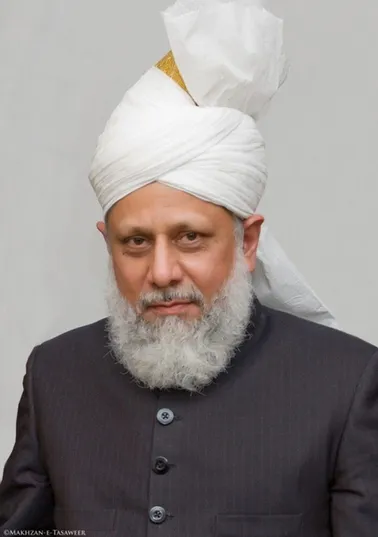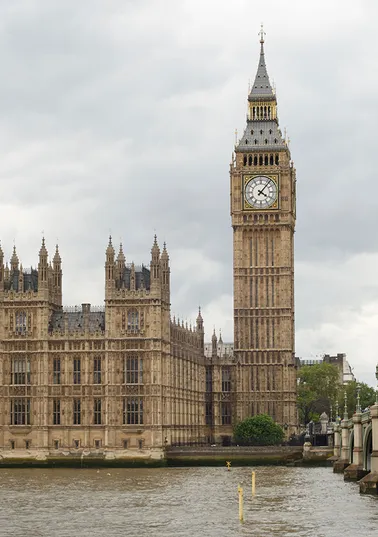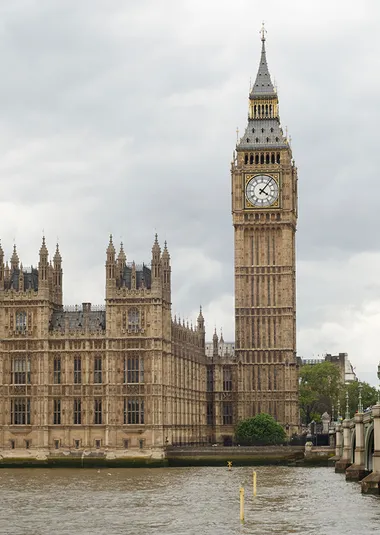- Introduction
- The Critical Need for Peace
- The Campaign
- WW1 Prophecy
- Introduction
- The Prophetic Poem
- The Earthquake Resembling Judgment Day
- Details of the Calamity
- When would the calamity strike?
- The Stage is Set
- The Tsar
- The Heir to the throne of Austria murdered!
- The July Crisis
- How Long Would the War Last?
- The Prophecy Reveals Itself
- An Unexpected Global Calamity
- Human Casualties
- The Desolation of Trench Warfare
- Theatres of War
- Shell Shock
- Hardship for Travellers
- Pitiable State of the Tsar
- The End of the Romanov Dynasty
- The Tragedy Unfolds
- Global Revolution
- Significance of the Prophecy
THE PROPHECY
Introduction
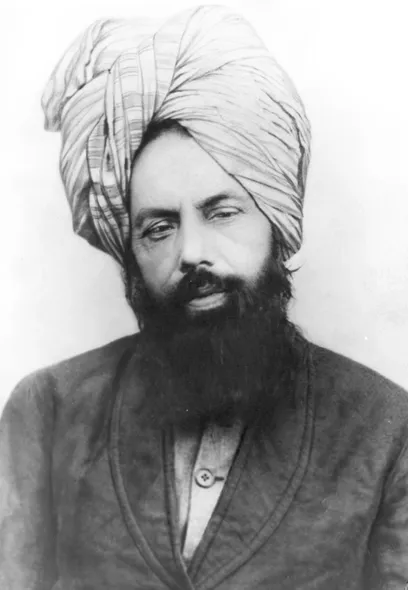
Hazrat Mirza Ghulam Ahmad of Qadianas
In 1905 the Promised Messiah, Mirza Ghulam Ahmad of Qadian, prophesied an unprecedented global calamity, based on divine revelation. He stated that on the basis of this sign depended the truth of his claim of being God’s appointed Messenger for this age, the Promised Messiah and Imam Mahdi (Guided One).
The prophecy was multifaceted, written in 1905, three years before his death, and published shortly thereafter, it found its fulfilment in the calamity of World War some nine years later. All aspects of the prophecy found extraordinary fulfilment. What follows from here is an elucidation of the prophecy’s different aspects.
The aim of highlighting this prophecy is to provide an example of God’s warning to the world, fulfilled, so that the warnings of World War III being given by the 5th Caliph (successor) of the Promised Messiahas today are taken with utmost seriousness.

Fazl Mosque, London
We invite you to join his campaign in calling Members of the UK Parliament to commit to peace through justice in domestic and international policy:
“Read it Attentively, for it is the Word of God”
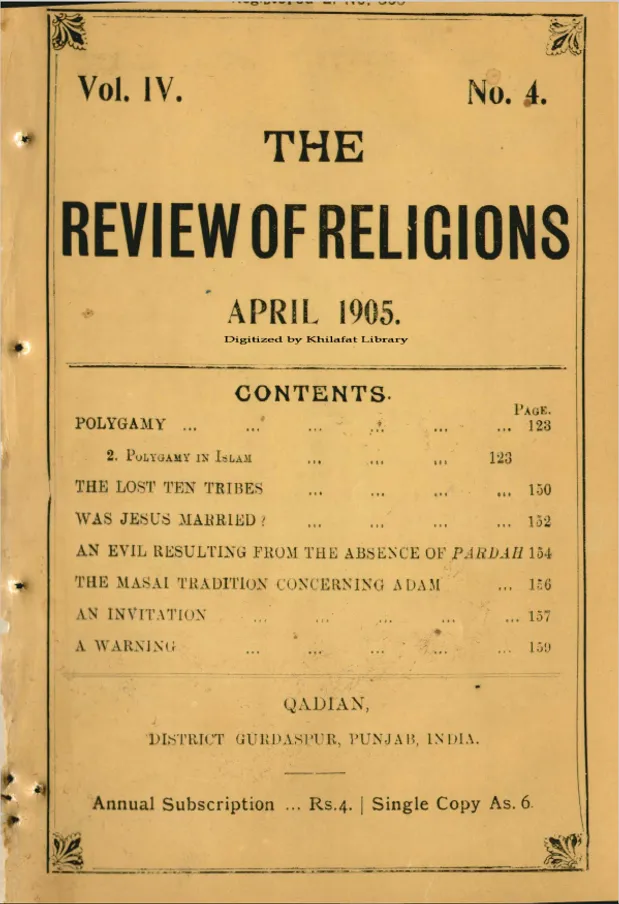
The Review of Religions, April 1905
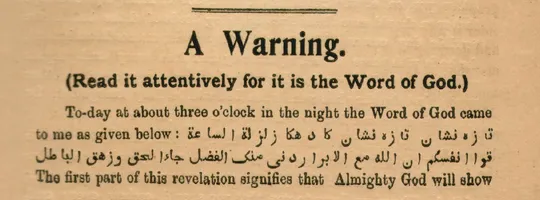
A Warning
On 4 April 1905, the Kangra earthquake struck the Punjab. It was the most destructive earthquake to hit the region in centuries, registering 7.8 Ms, and claiming over 20,000 lives. Ahmadas claimed to have foretold this clearly, with warnings of an imminent calamitous earthquake being published in his community’s magazine, The Review of Religions, in February and March 1905. Just a few days after the Kangra earthquake, Ahmadas published a grave warning in the April 1905 edition. He said that God had informed him that ‘an earthquake resembling Judgment Day’ was near at hand.
The Prophetic Poem
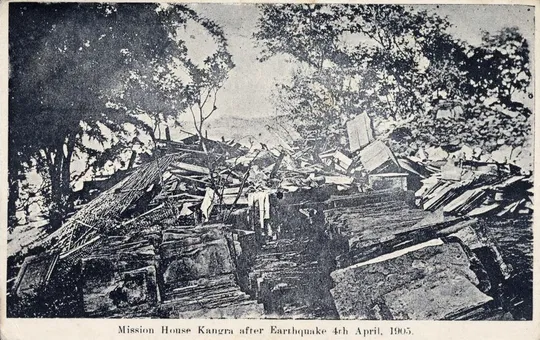
Devastation wreaked by the Kangra earthquake
Over the following few days, God revealed more to Ahmadas about the impending calamity. In a poem penned on 15 April, 1905, he gave many specific details in vivid verse:
A Sign will appear some time from now (today is April 15, 1905) which shall overwhelm villages, towns and meadows.
The wrath of God will bring a revolution in the world; the naked one will have no time to fasten his trousers.
Suddenly an earthquake will severely shake them all—be they humans, trees, rocks, or oceans.
In the twinkling of an eye the earth will be turned upside down and streams of blood will flow like the water of a rivulet.
Those whose night garments were white as jasmine will be in the morning [red] like the Sycamore tree.
Men shall lose their senses and birds their consciousness and nightingales and pigeons will forget their songs.
That hour will bear heavily upon every traveller and wayfarers will lose their way in confusion and deliriousness.
With the blood of the dead, the running waters of highland streams will turn red like Bistort Syrup.
The terror of it will exhaust all, great and small, and even the Tsar at that hour, will be in a pitiable state.
That Divine Sign will be a specimen of terror. The sky will attack with a drawn sword.
Hasten not to repudiate this, thou undiscerning fool, for my truthfulness depends entirely on the fulfilment of this Sign.
This is a prophecy based on Divine revelation and will surely be fulfilled; wait then awhile in righteousness and steadfastness.
The Earthquake Resembling Judgment Day
Earthquake or calamity? The warnings use the Arabic word ‘zalzalah,’ translated above as earthquake. The original word means both ‘earthquake’ and ‘calamity,’ with the Qur’an itself employing the latter meaning. Indeed, from his very first announcement on the matter, Ahmadas voiced his uncertainty as to whether a literal earthquake was meant or not. He wrote:
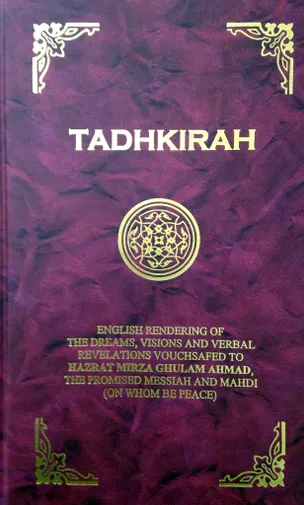
Tadhkirah
“I have not been told whether by earthquake in the revelation is meant a severe earthquake or some other calamity which shall overtake the world and which could be described as the Judgment Day...”
(The Review of Religions, April 1905)The details he received, detailed in the prophetic poem, indicated that the term earthquake was only meant figuratively. For what earthquake can overtake the entire world, bring global revolution, cause birds to forget their songs, and cause the Tzar to die in a pitiable state?
Details of the Calamity
A list of some of the qualities of this apocalyptic event listed in the prophetic poem runs as follows:
- It would be unexpected
- It would be unprecedented in its ferocity
- It would be global
- All peoples, both great and small, would be affected
- There would be enormous human casualties and blood loss
- It would occur in various theatres: cities, towns, meadows, rocky terrain, sea and sky
- Bird life would be affected
- There would be extraordinary psychological effects
- There would be hardships for travellers
- The plight of the Tsar of Russia would be particularly pitiable
- It would cause a worldwide transformation
When would the calamity strike?
Initially, Ahmadas believed that the calamity would be in his lifetime. According to his other revelations, he believed his life would not extend beyond sixteen years from the time of writing in 1905, and so he set this time period as an upper limit for the occurrence of the calamity.
Later, in 1906, Ahmadas was taught a prayer to delay the calamity until after his death. He was informed that this prayer was accepted:
“Allah has postponed it, till a time appointed.”
Curiously, as we shall see, the prophecy was fulfilled both after his death and within sixteen years of the prophecy being made, this being the 'time appointed.’
The Stage is Set
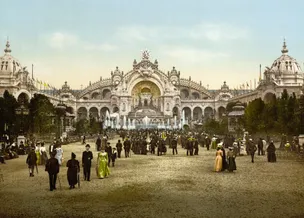
World Fair of Paris 1900
In Western Europe, the period between the end of Franco-Prussian War in 1871 and the Great War of 1914 came to be known as La Belle Époque — the Beautiful Era. The era would come to be seen as one of unusual political stability and economic progress. Science and technology made great advances, while arts and culture thrived. Of course, many of the fruits of this era had largely been gained from the plunder of previous eras. The world was still basking in the glow of imperialism, and had surrendered itself to shameless materialism. Excessive displays of wealth by the aristocracy of imperial powers was the norm. Meanwhile, many of the workers in these societies sought relief from their daily pain in the promise of socialism.
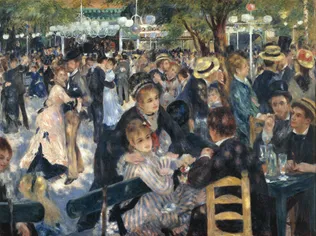
Arts flourished during the Belle Epoque. This famous painting is by Pierre Auguste Renoir, titled Le Moulin de la Galette
Under Pax Brittanica (British Peace), Britain was the undisputed world superpower. However, various other empires jostled for supremacy. While parliamentary democracies were increasingly developed, state monarchs still held political power and considerable public influence. The world had become globalised, with economies increasingly interdependent. In 1909 British writer Norman Angell wrote “Europe’s Optical Illusion,” arguing that any kind of new European war would be both unnecessary and futile.
It became an international bestseller.
The Tsar
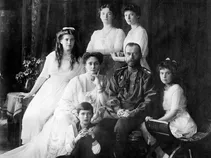
The Family of Tsar Nicholas II of Russia ca. 1914
By 1905, the House of Romanov had been ruling Russia for three centuries, under a succession of rulers known as Tsars. The title derived from the title of ‘Caesar’, and the Tsars ruled Russia under the pretext of Divine Ordinance. In the early 20th century, the Tsar was Nikolai Alexandrovich Romanov (1868–1918), also known as Nicholas II, ‘Emperor and Autocrat of all Russia.’ His Queen was Alexandra Feodorovna, and by her he had one son and four daughters.
Nicholas’ rule was absolute, justified theologically through the Russian Orthodox Church:
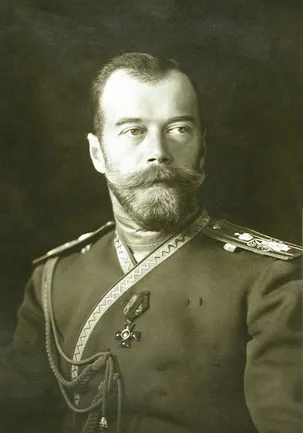
Tsar Nicholas II, Emporer and Autocrat of Russia
“The Emperor of Russia is the monarch absolute and unrestricted. To obey His superior power not only because of fear but as a conscience duty God Himself commands.”
(Article 1, Code of Law of the Russian Empire.)By 1914, the mighty Russian Empire was at the zenith of its power. It stretched across three continents, encompassing around one-sixth of the Earth’s land surface. Nicholas II’s Crown had also accumulated such great wealth that it has been estimated to be worth $300 billion today.
This amount makes him amongst the handful of the richest men in history, and the richest man of his time.
The Heir to the throne of Austria murdered!
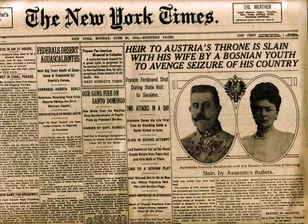
Headline of New York Times June 29 1914
After years of simmering discontent in the Austro-Hungarian Empire, the heir to the throne is assassinated.
The Manchester Guardian of June 29, 1914 reports:
“The Archduke Franz Ferdinand of Austria, nephew of the aged emperor and heir to the throne, was assassinated in the streets of Sarajevo, the Bosnian capital, yesterday afternoon. His wife, the Duchess of Hohenberg, was killed by the same assassin. Some reports say the duchess was deliberately shielding her husband from the second shot when she was killed...
The assassin of the archduke and his wife is a student named Gavrilo Prinzip. He is 19 and was born at Grahovo, in the district of Livno. He studied for some time in Belgrade. Prinzip declared he had intended for a long time to kill some eminent personage from nationalist motives. He made his attempt where the car had to slacken speed when turning into Francis Joseph Strasse. As the duchess was in the car he hesitated, but afterwards quickly fired two shots. The archduke was regarded in certain Serbian quarters as one of the greatest opponents of the pan-Serbian movement.”
The July Crisis
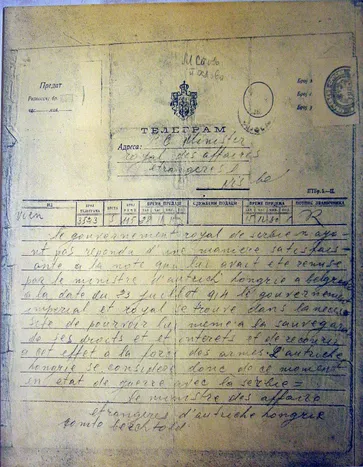
Austro-Hungarian government_s telegram to the government of Serbia on 28th July 1914, Declaration of war
July 1914 sees a month of political manoeuvrings and diplomatic efforts. They fail to avert war. The Austro-Hungarian Empire formally declares war on Serbia on 28 July. Russia, the self-proclaimed protector of the Slavic peoples, responds by mobilising its army for their protection. Germany issues an ultimatum for them to stop. It is ignored. Germany declares war against Russia and its ally France in the first few days of August. When Sergei Sasanov, the Russian Foreign Minister is presented the declaration of war by the German ambassador, he proclaims:
“The curses of the nations will be upon you!”
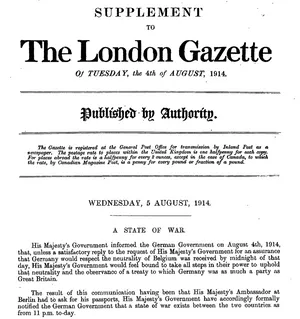
Document of Declaration of War by United Kingdom against Germany for violating territorial sovereignty of Belgium
But the Germans are already pressing ahead. Her generals seek to implement the ‘Schlieffen Plan,’ which seeks to swiftly overcome France before mobilising against the more sluggish Russian resistance. But heavy fortifications along the Franco-German border require Germany to violate the neutrality of Luxemburg and Belgium. As a guarantor of Belgium’s neutrality, Britain is drawn into the war on 4 August.
The Great War had begun.
How Long Would the War Last?
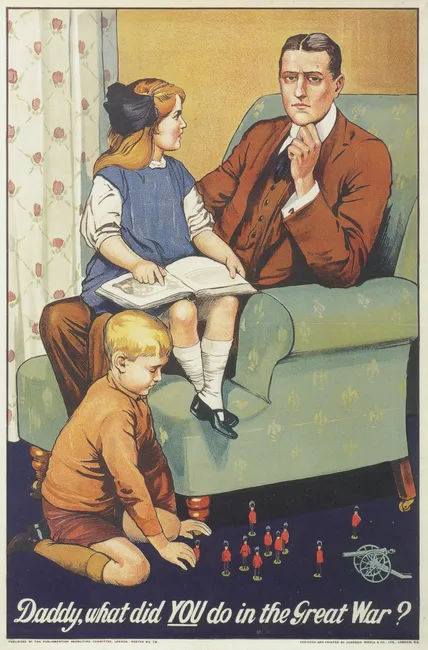
War Propaganda. Posters like these sought to play on the guilt of those who stayed at home
As his troops departed, the German Kaiser told them: “You will be home before the leaves have fallen from the trees.”
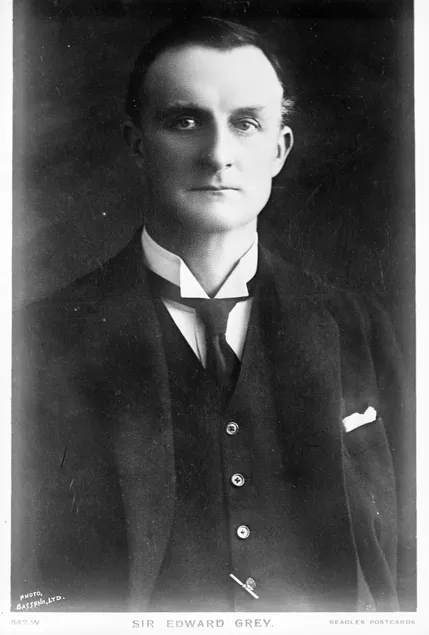
Sir Edward Grey, 1914, British Foreign Secretary.
The sentiment was widespread. An officer in the Russian Imperial Guard was unsure of whether to take his dress uniform with him for when he enters Berlin in victory, or to wait for the next courier. A short and sharp war was generally expected. Borders would be redrawn, and European life would resume as before. But some were not so optimistic. On the eve of Britain’s declaration of war, Sir Edward Grey, the British Foreign Secretary said:
“The lamps are going out all over Europe. We shall not see them lit again in our lifetime.”
Sir Edward could only have a dim perception of what lay ahead. At this time, the war was not global. Neither the Ottomans nor the Americans were involved. The Tsar’s position was secure; he declared war in front of a crowd of 250,000 devoted onlookers, who sang ‘God save the Tsar.’ The nature of the war was not yet known. It had only just begun.
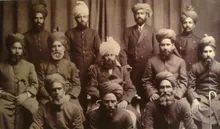
The 2nd Khalifa on his tour of Europe, 1924, with companions
The Prophecy Reveals Itself
The prophecy of the Promised Messiahas was not retrospectively assigned to the events of World War I.
As the war was unfolding, the 2nd Khalifara of the Ahmadiyya Community and his followers perceived the significance of what was happening. In the August 1914 edition of The Review of Religions, the community reprinted Hazrat Ahmad’sas prophecy. The editor of the magazine remarked:
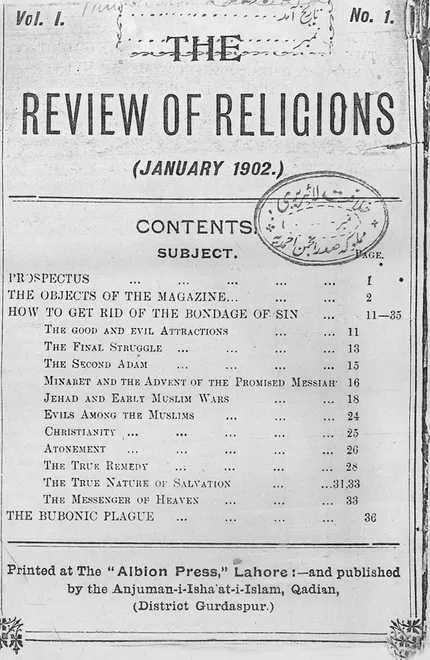
Jan 1902 Review of Religions 1st Edition
“This is a harrowing account of a future distress which is to fall humanity in the near or remote future. The description is of a complex character and its dire details are dreadful enough to cause a shudder and make one’s hair stand on end... the name of Russian Tsar attaches special interest to the predicted event... Our readers can easily interpret the wording of the Promised Messiahas in the light of the events as they occur under their very eyes and testify to the truth of the prophecy according to their own way of looking at things.”
The community went on reprint the prophecy in September 1914, June 1915, January 1916 and March 1917. It was widely accepted that this was the promised cataclysm.
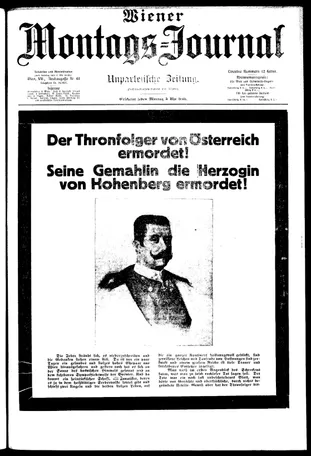
An Austrian newspaper runs the title_ _The heir to the throne of Austria murdered! His wife the duchess of Hohenberg murdered!
An Unexpected Global Calamity
World War I was not expected. It was triggered by a freak political event — the assassination of the heir to the Austrian throne.
“Suddenly an earthquake will severely shake them all...”
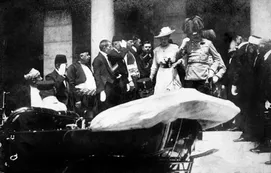
Franz Ferdinand and his wife Sophie five minutes before the assassination
As a result of the assassination, the Austro-Hungarians decided to squash Serbian nationalism. Even then, Russia was not obliged under any treaty to defend the Serbs. But the Tsar said he felt morally compelled to do so. Through a series of tenuous alliances, Europe found itself at war after decades of relative peace.
“The naked one will have no time to fasten his trousers...”
It was literally the case that in some battles people had no time to dress. The following report relates to the Belgian town of Contich:
“The German guns had been brought up to the bank of a river nearby, and from the position they threw shrapnel into the doomed town. There were many who had to flee naked as they were down the streets in panic, when the enemy opened fire on them. The place presented a picture of utter desolation.” (The Sphere, 28 November 1914)
“The terror of it will exhaust all, great and small...”
The Promised Messiah’sas prophecy declared the calamity as being global in its scope. At the outbreak of war, it was only continental. But by the end of the war, the world was largely divided into two blocs:
- The Allied Powers included the British, the French, the Russians, the USA, China and Japan.
- The Central Powers included the Austro-Hungarian Empire, the German Empire and the Ottomans.
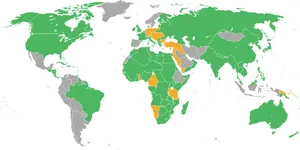
Allies vs Central powers. This was a truly global war. Green colour is for Allies, Yellow for Central powers and Grey for Neutral.
As the great powers had colonised most of the world, colonial troops from across the globe joined in the fight. While the Western Front is most fresh in European memories, the first shot fired by a soldier in British Service was one by Alhaji Grunshi, in Togoland, West Africa. Within the warring nations, all were affected. Mass conscription was implemented, bringing in soldiers from every stratum of society. Wealth accumulated over centuries by Europe’s decadent elite was levelled to the ground. Even neutral states found themselves disturbed, unable to escape the consequences of the belligerent actors.
Human Casualties
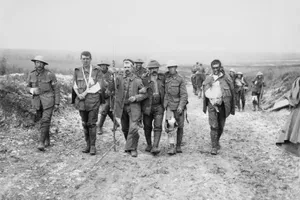
The Walking Wounded. A German prisoner helps British wounded make their way to a dressing station near Bernafay Wood following fighting on Bazentin Ridge, 19 July 1916, during the Battle of the Somme.
The Great War was the bloodiest war the world had ever known. 10 million soldiers died, with 7 million civilian casualties.
“... Streams of blood will flow like the water of a rivulet.”
While streams of blood flowed from all the dead, this line of the prophetic poem met with literal fulfilment in Gallipoli. The date was 25 April, 1915. The Allies were attempting to seize the Dardanelle straits from the Ottoman Empire. But the Ottomans held higher ground on land, and they massacred the allies at sea. The shore was described in chilling terms:
“...absolutely red with blood to 50 yards out.” (Commander Charles Samson, on aerial reconnaissance).
"The fire changed the colour of the sea with the blood from the bodies of the enemy – a sea whose colour had remained the same for years.” (Ottoman Turkish Commander, Major Mahmut).
“Those whose night garments were white as jasmine, Will be in the morning clad in red like the Sycamore tree.”
The 2nd Khalifara of the Ahmadiyya Muslim Community explained how this prophecy was literally fulfilled in vivid detail in March 1917:
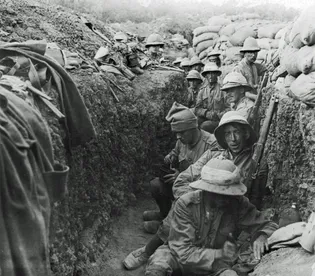
Gallipoli. Soldiers in the trenches on the southern section of Gallipoli Peninsula during World War I. The men belong to the Royal Irish Fusiliers.
“Sycamore leaves contain such redness just like the colour of thick coagulated blood. And it looks exactly like blood. Now look, in France, where the fighting has been the most intense and still is now, sycamore trees are spread far and wide in the battlefields there. Incidentally, only a short while ago, one of our friends wrote that: ‘I am standing in the battlefield in order to perform military service. Bombs are raining down and I am standing under a sycamore tree while reciting this couplet of the Promised Messiahas: Those whose night garments were white as jasmine will be in the morning red like the Sycamore tree.’... Thus, this no longer remains a statement of poetic notion; instead the act of God has showed that in reality, at that location, there were the leaves of sycamore trees and garments were taking on their very colour.”
The Desolation of Trench Warfare
WWI saw fighting in every conceivable terrain and theatre. It was global in the truest sense of the word.
“In the twinkling of an eye the land will be turned upside down.”
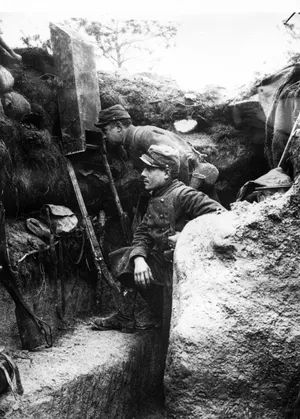
Trench Warfare. Periscope use in a French first line trench
This verse was literally fulfilled with the prominence of Trench Warfare in World War I. It transformed many of the scenic landscapes of northern France and the Belgian Flanders beyond the point of recognition. The digging of trenches upheaved the earth while artillery shelling and mines led to craters, some of which can still be seen today.
“A Sign will appear... which shall overwhelm villages, towns and meadows...”
Dr Dorothee Brantz, environmental historian of warfare, writes: “Villages and towns lay in ruins, fields had been turned into moonscapes, and forests had been reduced to acres of stumps.”
“Suddenly a calamity will severely shake them all — be they humans, trees, rocks, or oceans.”
“350,000 hectares of forest had been destroyed during the war, an amount that would have supplied the tree harvest for the next sixty years.” (French Forestry service).
“Not a brick or stone is to be seen, except where it has been churned up by a bursting shell. Not a tree stands. Not a square foot of surface has escaped mutilation. There is nothing but the mud and the gaping shell-holes; a chaotic wilderness of shell-holes, rim overlapping rim; and, in the bottom of many, the bodies of the dead.” (Major Rowland Charles Fielding on the Western Front).
Theatres of War
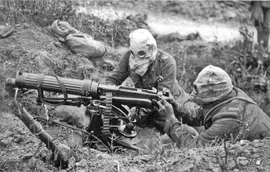
Chemical Weapons. British Vickers machine gun crew wearing PH-type anti-gas helmets. Near Ovillers during the Battle of the Somme, July 1916
The prophetic poem also mentioned the involvement of the seas. Another revelation of the Promised Messiahas in 1906 elaborates upon it:
“Vessels sail that there may be duels.”
Commenting on this prophecy, the 2nd Khalifara explains that: “The expression used in the revelation is kashti (vessels) which points to a bias for fighting sea craft of small size.”
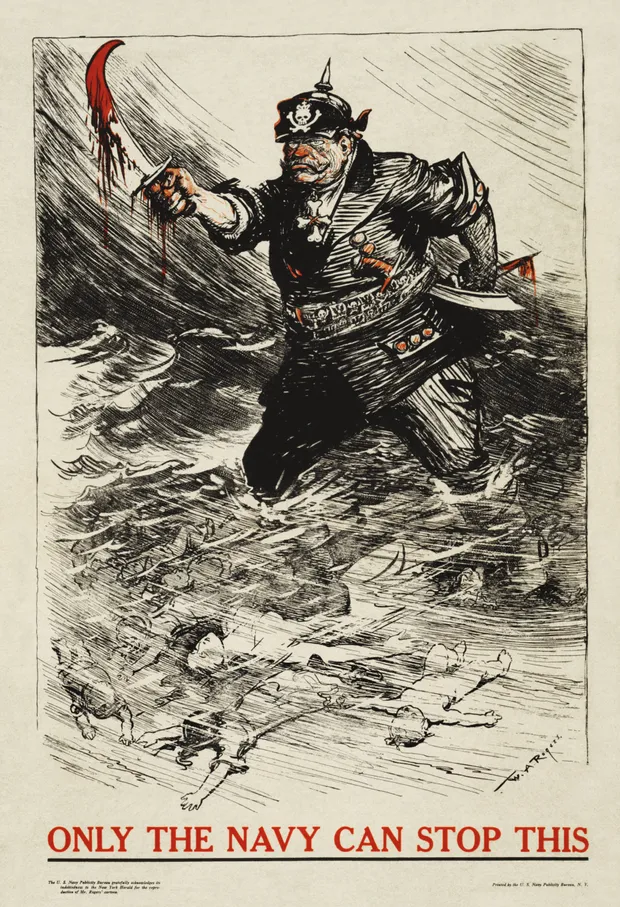
WWI Recruitment poster. An anthropomorphised Germany wades through a sea of dead bodies, with the slogan _Only the Navy can Stop This_. A reference to the devastating German U-boat campaign sinking civilian ships
Larger battleships, such as the colossal dreadnoughts, were originally thought to be game-changers, and were the focus of naval development. However most naval warfare in World War I involved a novel vessel: the submarine, or U-boat (short for the German ‘Unterseeboot,’ meaning ‘undersea-boat’). The German Navy’s U-boat fleet sought to counteract the numerical superiority of the Royal Navy. The German campaign initially involved the sinking of allied warships followed by their merchant ships. It escalated into the indiscriminate sinking of neutral civilian ships, eventually bringing the USA into the war.
“The sky will attack with a drawn sword.”
At the time of the prophecy, the Wright Brothers were still struggling to keep their flying machine in the air. It would not be for many years that they could convince others to buy them. Initially, airplanes were just used for reconnaissance. Then bombs began to be dropped from them, and the addition of machine guns to the planes turned them into real weapons. By the end of the war, engineers had worked out how to synchronise machine-gun fire with the rotation of the propeller blades. Thus, modern dogfighting was born. Later in 1905, Ahmadas received two more revelations relating to modern warfare:
“The arrows of death do not miss.”
“When armies and poison will descend from the sky.”
Shell Shock
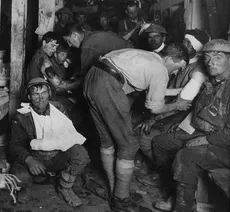
Image taken in an Australian Advanced Dressing Station near Ypres in 1917. The wounded soldier in the lower left has a dazed, thousand-yard stare - a frequent sign of _shell-shock.
Long stretches of trench warfare, relentless shelling, and endless casualties made World War I a particularly traumatic experience for its soldiers.
“Men shall lose their senses...”
A novel combination of medical symptoms appeared among soldiers, including delusional states, nervous collapses, paralysis and tremors. These symptoms were not a direct result of demonstrable physical damage to the brain, but seemed to be primarily psychological in nature. Charles Myers, a British psychiatrist, called it shell shock in a landmark issue of the Lancet in 1915. It’s now understood as being a type of Post-Traumatic Stress Disorder (PTSD).
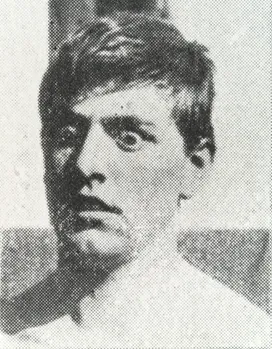
A patient suffering from war neurosis
In October 1917, Siegfried Sassoon, the decorated war poet and a victim of shell shock, wrote a poem describing its sufferers and their perceptions by others:
These boys with old, scared faces, learning to walk.
They’ll soon forget their haunted nights; their cowed
Subjection to the ghosts of friends who died,—
Their dreams that drip with murder; and they’ll be proud
Of glorious war that shatter’d all their pride...
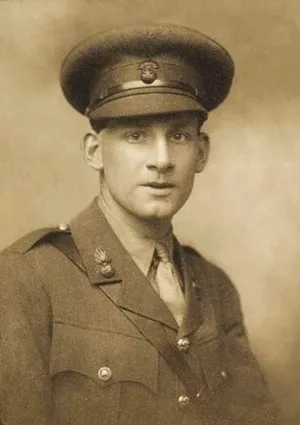
Siegfried Sassoon, CBE, MC - decorated war poet and victim of shell shock
“...and birds their consciousness and nightingales and pigeons will forget their songs.”
The endless bombing and the destruction of tree life was catastrophic for bird populations in the war. Without safe ground to alight, and with canon-fire keeping them in the air, many would die of exhaustion and fatigue. For instance, the Belgian Waterslager population came close to extinction during the war. Of note, this particular bird is a canary, a species famous for its beautiful song.The artillery-fire was loud enough to cause permanent hearing loss among gunners. Like humans, birds cannot sing in tune once deaf. Inevitably, birds too would have lost their songs from the deafening cacophony of war.

A Male Atlantic Canary
Hardship for Travellers
The methods of transport that boomed towards the end of the 19th century were suddenly cut off with WWI.
“That hour will bear heavily upon every traveller and wayfarers will lose their way in confusion and deliriousness.”
In pre-war Europe, the affluent of each country would holiday in neighbouring countries, unsuspecting of the calamity that was about to break out. The summer of 1914 was prime-time for such foreign travel. Suddenly, tourists holidaying in Germany and Austria were detained after war broke out. They found themselves penniless in a hostile environment, and under constant surveillance. Civilian travel in apparently neutral waters became fraught with danger. Due to the unrestricted submarine warfare policy of the Germans, vessels carrying non-combatant passengers were constantly in danger of being sunk.
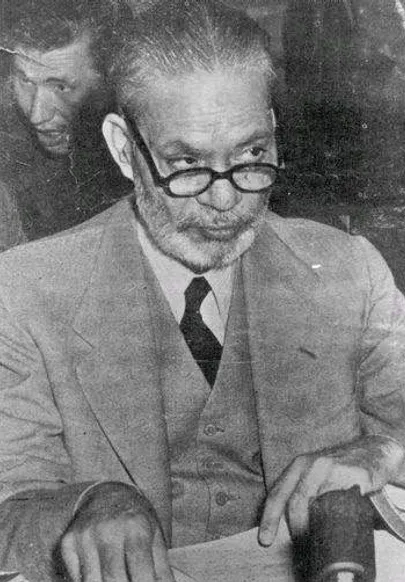
Sir Muhammad Zafarullah Khan KCSI - companion of the Promised Messiah, jurist, and statesman
Describing his narrow escape from a German U-boat in one of his memoirs, Sir Muhammad Zafrulla Khanra (1893–1985), Ahmadi Muslim, and former President of the UN General Assembly and International Court of Justice, recalls:
“I was called to the Bar in June, 1914, but had to stay on for my Bachelor of Law’s degree examination in October, 1914, which means that I was in England at the beginning of the First World War. My three years’ stay in England, therefore, coincided with the three last peace years in Europe and in a sense, in the world... I returned to India, as it then was, in October, 1914. We travelled by the ill-fated S.S. Arabia, which was one of the mail steamers of the Peninsular and Oriental Company. The German destroyer, Emden, was then operating in the Arabian Sea. It had already sunk several vessels. We made the voyage all right, but on a subsequent voyage the Arabia, like so many other vessels, was sunk by the Emden in the Arabian Sea."
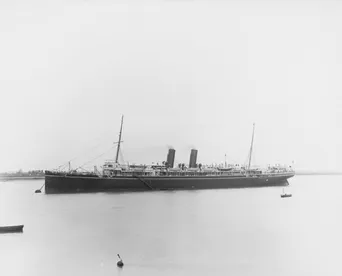
The ill-fated S.S. Arabia
Pitiable State of the Tsar
At the beginning of the war, the Tsar's kingdom stretched over one sixth of the Earth's landmass. Perhaps the most extraordinary part of the prophetic poem relates to the miserable plight of The Tsar. He was the only monarch specifically singled out by the prophecy, though the world at that time abounded in influential monarchs.
“The terror of it will exhaust all, great and small, and even the Tsar at that hour, will be in a pitiable state.”
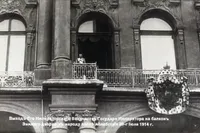
Tsar Nicholas II declares war on Germany
In light of the grammatical and linguistic structure of this line of the prophetic poem, the 2nd Khalifara inferred the following conditions for the fulfilment of this prophecy:
“The prophecy indicated several things in respect to this portion:
Firstly, the Tsar’s government would not be shaken by internal revolutions before the beginning of this war (as the Tsar will still be in power).
Secondly, that his government would not survive the war, as it had been foretold that he would be reduced to a miserable plight during the war (and thus his government will be terminated).
Thirdly, that he would be dethroned before his death (as it is impossible for him to be in a pitiable state whilst still on the throne).
Fourthly, that he would be the last Tsar, for the words of the prophecy were directed against Tsars as such, and not against any particular monarch.
Lastly, that he would not die suddenly but would be subjected to great humiliation, disgrace and torture (as indicated by the prophesied pitiable state that he will be in).”
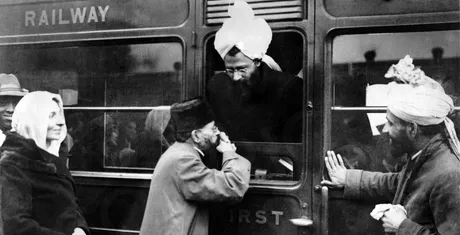
Hazrat Khalifatul Masih II with some devoted followers, UK, 1924.
Even in 1914, this seemed wildly improbable. Though the Tsar had suffered some political setbacks in his career, he was bolstered by the declaration of war against the Austro-Hungarian Empire. A quarter of a million loyal subjects gathered for the declaration, and they sang the national anthem — ‘God Save the Tsar.’
The End of the Romanov Dynasty
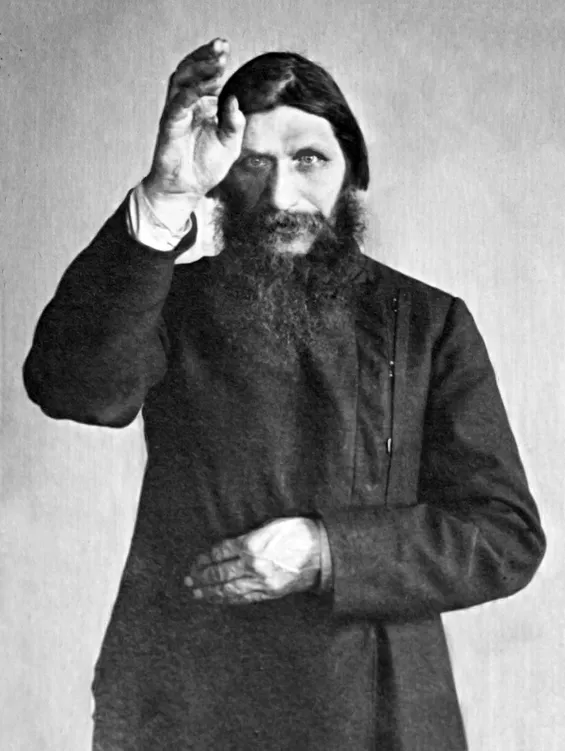
Rasputin. A self-proclaimed mystic healer believed to be a prophet by some. Followed avidly by the Tsarina. He was killed in 1916
Russian optimism was not to last long. Soon, their army was losing provinces to the more industrial Germans. This prompted the dutiful Nicholas II to assume direct command of the Russian armies in September 1915. His decision was disastrous. From then on, Russia’s defeats became inextricably associated with the Tsar himself. While the Tsar was on the front lines, the Queen was left in charge of domestic affairs. Accused of treachery on account of her German ancestry, and criticised for her corrosive relationship with the mystic Rasputin, she rapidly lost the respect of both the aristocracy and the population at large.
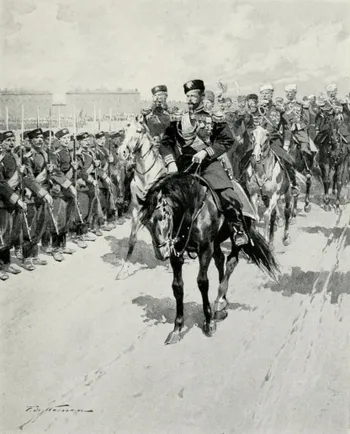
Tsar Nicholas II reviewing the troops
The effect of continual warfare compounded with poor administration led to extreme inflation, fuel shortages, and food scarcity. The discontent born of this suffering came to the fore in 1917’s February Revolution. There were widespread demonstrations against the Tsar. Nicholas II was forced to abdicate in favour of his brother, Grand Duke Mikhail. Mikhail however declined the Crown. With this, the three-centuries old Romanov dynasty came to an end. There would be no more Tsars. But Nicholas II and his family’s woes had only just begun.
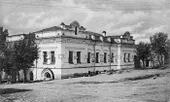
The Ipatiev House where the Romanovs spent their final days. Photo from 1930
Now exiles, they sought asylum with British and the French Royalty. It was not granted. Nicholas’ family lived for some time in an old palace under house arrest. They suffered various indignities at the hands of their guards — from being harassed, to losing the privacy of their own rooms. Crowds would gather at their gates, hurling insults. Their situation was soon to worsen dramatically. In April 1918 the Romanovs were transferred to the House of Special Purpose in the hostile region of the Urals, suffering much at the hands of their guards. Here they were kept under strict conditions in a stifling enclosure. It is said that when an exasperated Grand Duchess Anastasia opened a window, her action was met with rifle fire from a sentry, the bullet lodging in the window frame. Their case was miserable, their fate still uncertain.
The Tragedy Unfolds
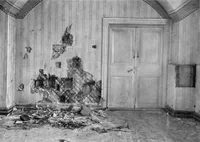
Ipatyev house basement. The room where the Tsar and his family were executed
On the night of 17 July, 1918, the Tsar and his family were brutally murdered.
The decision to execute them was prompted by the Bolshevik high-command, who perceived that Tsarist loyalists could soon rescue Nicholas and his family. The details of their deaths were kept secret until after the collapse of the Soviet Union. One powerful eyewitness testimony comes from the confession note of Yakov Yurovsky — the chief executioner. He describes the last moments of the family and their personal physician, Dr Botkin, in chilling detail:
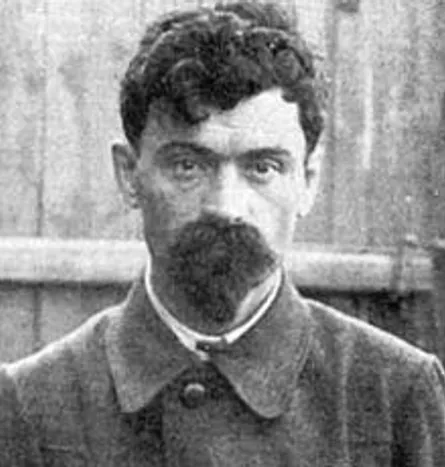
Yakov Mikhailovich Yurovsky, chief executioner of the Romanovs, 1918
“I went to the lodgings, woke up Dr Botkin, and told him that everyone has to dress quickly because there are disturbances in the city, and that I must transfer them to a safer place... The room was very small. Nikolai stood with his back to me. I announced: the Executive Committee of Soviet Workers, Peasants and Soldier Deputies of the Urals carried [a decision] to shoot them... I repeated the order and commanded ‘Shoot.’ I shot first and killed Nikolai... The firing went on for a very long time, and despite my hopes that the wooden wall would not cause a ricochet, the bullets bounced off it. I was not able to stop this shooting for a long time, which took on a disorderly character. But when I finally was able to stop it, I realized that many were still alive. For instance, Dr Botkin lay propped up on the elbow of his right arm, as if in a relaxed pose, a revolver shot finished him off. Alexei, Tatiana, Anastasia and Olga were still alive too. Also alive was Demidova. Commandant Ermakov wanted to finish the job with a bayonet. However, this was not possible. The reason for this became clear later (the daughters had diamond armor [sewn] into their under bodices). I was forced to shoot each one in turn."
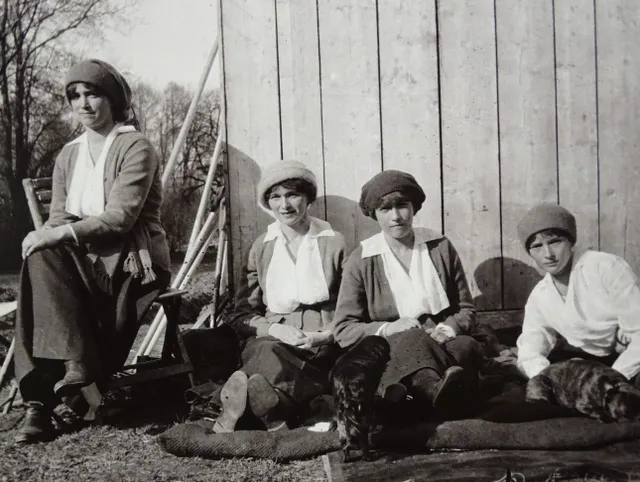
Daugters of the Tsar. From left to right, Grand Duchesses Maria, Olga, Anastasia and Tatiana Nikolaevna of Russia in captivity at Tsarskoe Selo in the spring of 1917. One of the last known photographs of Tsar Nicholas II daughters.
The indignities the family would face were not yet over. The deceased were buried in two mass graves, their jewels stolen, their bones crushed by the butts of rifles, and their countenances defaced beyond all recognition with acid. Though the fate of the Romanovs is profoundly tragic, they are surely a fulfilment of the great warning of Hazrat Ahmadas. The 2nd Khalifara of the Ahmadiyya Muslim Community writes:
“A recital of his sufferings makes one’s hair stand on end and causes one’s heart to weep for him, but at the same time, one’s faith in the Omniscient God is also enhanced when one sees how He had revealed these things twelve years prior to their occurrence, at a time when nobody could even imagine that they could come to pass."
Global Revolution
World War I was undoubtedly one of the most transformative events in history, bearing momentous consequences in every domain of human life.
“The wrath of God will bring a revolution in the world”
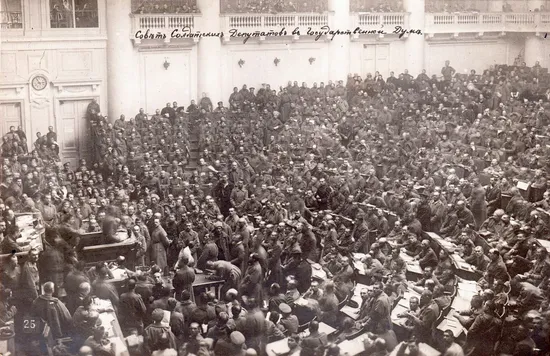
Petrograd Soviet assembly in 1917
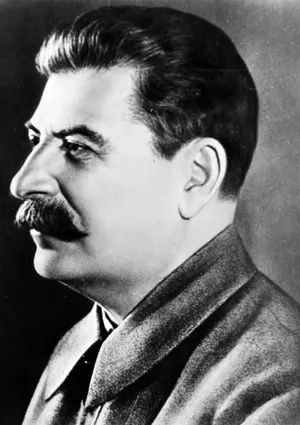
Joseph Stalin. Revolutionary and Secretary general Communist Party 1922-52. Pictured here in 1942.
On a political level, the war resulted in the collapse of four major empires: German, Austro-Hungarian, Russian and Ottoman. In their place, new borders and smaller nation states with new political systems were carved out, thus forever changing the map of Europe and the Middle East. The most radical change perhaps was that caused by the 1917 Bolshevik Revolution in Russia, described by Professor S. A. Smith as “the most consequential event of the 20th century” for its role in shaping subsequent history. Not only this, but the legacy of the war would give birth to another world war, one which would complete the change of the global order; transform the old world into the new.
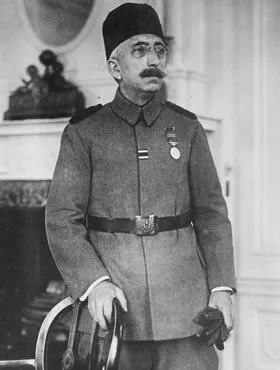
Sultan Mehmed VI. Last Sultan of the Ottoman Empire
“It is a deluge, it is a convulsion of Nature... bringing unheard of changes in the social and industrial fabric. It is a cyclone which is tearing up by the roots the ornamental plants of modern society.”
(David Lloyd George, future Prime Minister of Britain, 1915)Significance of the Prophecy
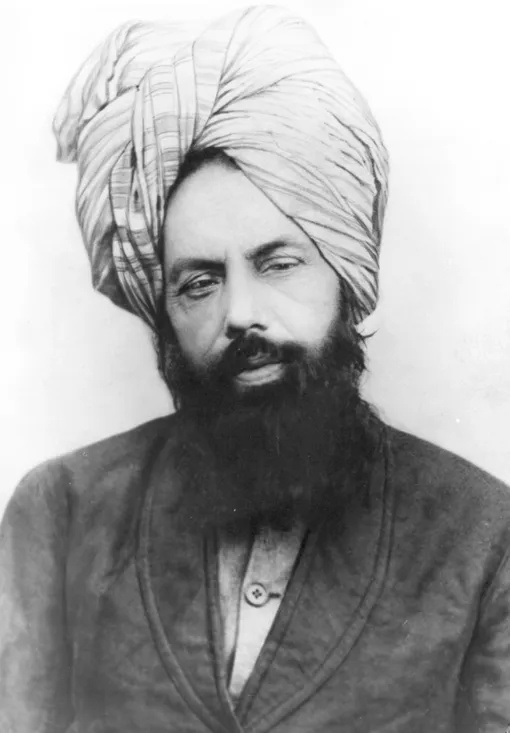
Hazrat Mirza Ghulam Ahmad of Qadianas
Hazrat Ahmadas foretold that the earthquake resembling Judgment Day was to be among his premier signs — and indeed it was.
“Hasten not to repudiate this, thou undiscerning fool, for my truthfulness depends entirely on the fulfilment of this Sign. This is a prophecy based on Divine revelation and will surely be fulfilled; wait then awhile in righteousness and steadfastness.”
He warned to Hazrat Ahmadas of divine punishment to a world that had become embroiled in immorality, godlessness, and cruelty. Like all prophecies of warning, it was conditional on the conduct of the people to whom it was addressed. As Ahmadas himself said:
“If no such extraordinary Sign appears, while people have not openly reformed their way of life, I shall in such case have been proved false.”
No reform occurred, the extraordinary sign was fulfilled, and Ahmadas was proved true. The First World War sent shockwaves throughout history, upon which the Promised Messiah’sas words have reverberated throughout the world. No nation, nor individual, can claim ignorance of the First World War. None cognisant of the prophecy can deny that Hazrat Ahmad’sas words were fulfilled with stunning clarity.
Thus through such a tragic event, God has ordained some good — to lead future seekers of truth to the recognise the Messiah of the Ageas. The spiritual legacy of the war therefore lies with you, dear reader. Will you choose to accept it, or reject it?
Contact
National Outreach Department:181 London Rd, Morden SM4 5PT, U.K.
Email: [email protected]Phone: 0208 6877804
@ 2025 Ahmadiyya Muslim Community, All Rights Reserved.
